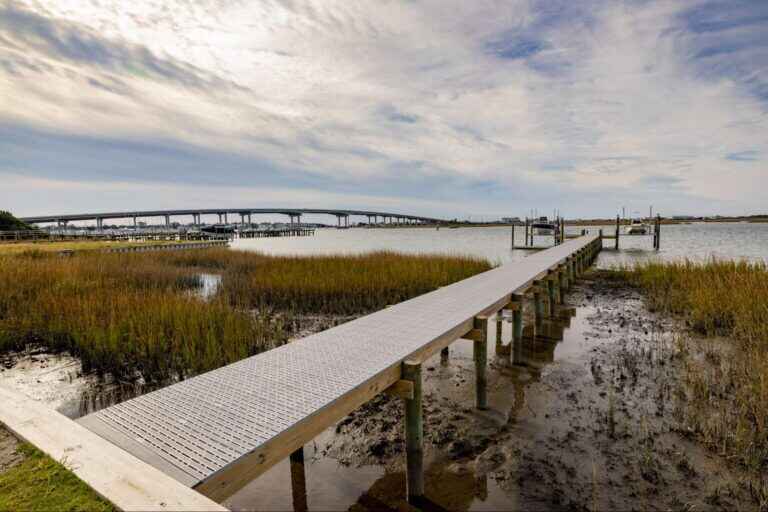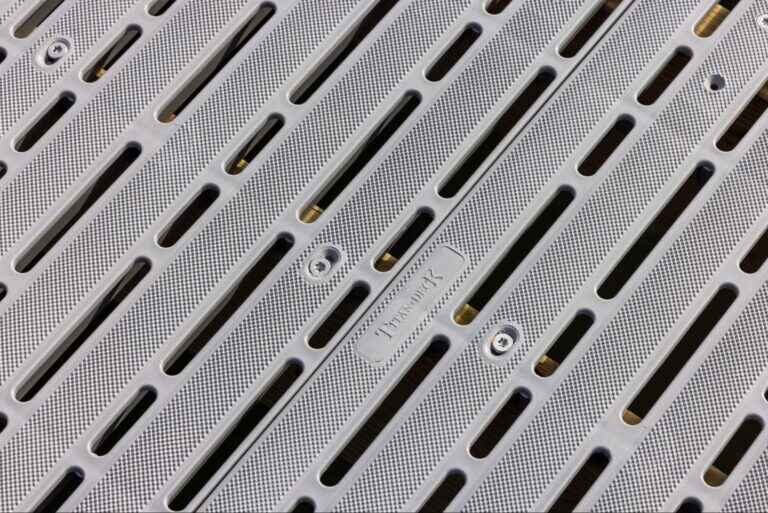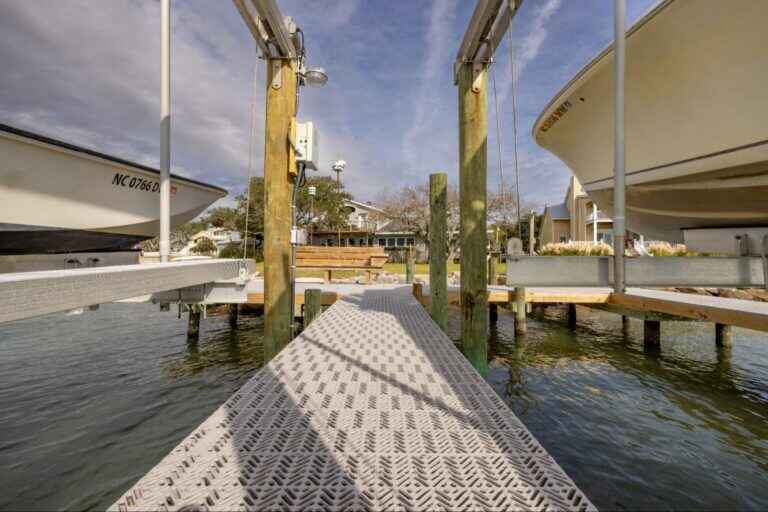
Marine construction has a large emphasis on durability and performance. Modern decking materials have so much more to offer than traditional lumber when it comes to improving the longevity of docks. Customer satisfaction and long-term performance are closely intertwined, and contractors and builders often have the task of choosing the ideal decking material that looks the best and lasts the longest. Three decking materials usually compete in those two categories: composite wood, PVC plastic and polypropylene decking options like Titan decking. In recent years, the marine construction industry has witnessed a significant shift towards synthetic materials that offer enhanced durability and reduced maintenance. This evolution is driven by the need for materials that can withstand harsh marine environments while providing aesthetic appeal and safety.
When comparing marine decking materials, it is important to evaluate factors like moisture resistance, UV durability, load capacity, slip resistance, maintenance requirements, and ease of installation. Whether you are constructing a dock, waterfront walkway, or platform, in harsh coastal environments, choosing the right material can greatly influence the projects longevity and user safety. Additionally, considering the environmental impact and sustainability of decking materials has become increasingly important. Materials that are recyclable not only reduce environmental footprints but also appeal to eco-conscious clients. For example, polypropylene decking like Titan Deck is made from high-quality, UV-protected polypropylene and is 100% recyclable, unlike some composite and PVC options which may be more difficult to recycle due to their material blends. Traditional wood docks, while aesthetically pleasing upon installation, come with their own set of challenges including the frequent maintenance and ongoing need to seal and stain decks annually to prevent them from rotting, fading, cracking, insect damage, and discoloration that can occur over time and even more in humid or coastal areas. It is important for contractors to weigh not only initial installation cost but long term cost implications. Some materials, like polypropylene, may have slightly higher upfront pricing, but their unmatched durability and low maintenance often result in significant savings over time. Builders, designers, and homeowners now look for a low maintenance, long lasting alternative like this.
Let’s delve into the ins and outs of these materials and discuss their unique properties, maintenance requirements and lifetime performance. By effectively communicating the advantages of each material to customers, contractors can confidently recommend the best decking solution for each job, and ensure that the deck delivers performance and charm for the long run.
Composite Marine Decks
Composite wood is among the most common materials used for marine decking in the industry today. Composite decking is a durable and low-maintenance decking material made from a blend of wood fibers or sawdust and recycled plastic materials. Composite decking materials offer enhanced resistance to weathering and decay, making it a popular choice for marine environments exposed to constant moisture, saltwater and humidity. This blend of organic and synthetic materials results in a product that combines natural appearance of wood with the resilience of plastic, offering a balanced solution for many marine applications.
Unlike traditional wood decking, composite decking does not rot, warp, fade or attract insects, with a lifespan of around 25 years. It is available in a wide range of colors, textures and finishes, allowing contractors to cater to diverse design preferences. Some composite boards are capped with a protective polymer shell that adds even greater resistance to fading, staining, and scratching, although it can contribute to a slicker surface when wet. They often feature three or four sided polymer caps, the four sided cap is the most protective of water from all sides, including the bottom of the board, so the decking lasts longer. The three sided caps do not protect in the same way. Beyond moisture protection, the decking caps prevent mold and mildew growth, and they will not crack or fade like wood decking. Mold and mildew can form in areas that are not properly cleaned or protected. Others may use uncapped designs that mimic the feel of natural wood more closely, but these can require slightly more care over time.
While composite decking generally comes with a higher upfront cost compared to wood decking, contractors should emphasize its long-term cost savings through reduced maintenance and increased longevity, although it does not last quite as long as polypropylene decking. Furthermore, the structural integrity of composite decking is suitable for various load bearing applications, ensuring safety and reliability in both residential and commercial settings.
However, customers should be aware that composite decking is not ideal for bare feet — shoes are needed when walking on composite decks because they can retain heat and become exceptionally hot during peak sunshine hours. Unlike traditional wood decking that can be repaired or refinished, composite decking is not as easily repairable. In the event of significant damage, such as deep scratches or chips, the affected boards may need to be replaced entirely, which can be more challenging and costly. Additionally, while composite decking resists many forms of damage, it can still be susceptible to staining from certain substances if not promptly cleaned, necessitating regular maintenance to preserve its appearance. It is also worth noting that due to the blend of organic and synthetic materials, composite boards are generally not recyclable in the same way pure plastics are, which could be a consideration for more eco-conscious clients.
For clients looking for something similar to the classic wood look, composite decking is their best bet for a deck that will have an old-fashioned feel while lasting longer than one or two years against the elements. Although, contractors working in coastal or high-salinity regions should be particularly cautious when recommending composite materials, as salt exposure can still degrade uncapped boards over time. Additionally, composite decking may become slippery when wet, especially if the surface is smooth. Regular washing, using boards with textured finishes and coatings can reduce these hazards.
PVC Marine Decking
PVC decking is a type of decking material made from synthetic plastic polymers. One key advantage of PVC decking is its exceptional resistance to moisture, making it highly suitable for marine environments where decks are exposed to constant water and humidity. It does not rot, warp or splinter like traditional wood decking. Contractors should also be aware that PVC decking offers excellent durability as well as resistance to fading, staining and scratching. Its low-maintenance nature is another significant benefit, as it does not require staining or painting, and can last almost 50 years without having to seal it. The longevity of PVC decking makes it an attractive option for homeowners seeking a long term solution with minimal upkeep, especially in challenging environmental conditions.
PVC decking boards are made from 100% plastic, often polyvinyl chloride, which results in a very dense and rigid product that can be relatively stiff compared to other materials, which may limit its flexibility in certain applications and makes it slightly more difficult to install. In situations where the deck needs to accommodate unusual shapes or contours, PVC may require additional planning and customization to ensure proper installation.
While PVC decking is available in a range of colors and textures, its aesthetic appeal may not match that of natural wood or other composite materials. Some clients may prefer the authentic look and feel of wood, which PVC decking may not fully replicate. Contractors should advise their clients that, like composite decking, PVC plastic decking can become very hot under direct sunlight, so utilizing lighter colors or implementing shading measures can help address this issue. Moreover, the thermal expansion and contraction properties of PVC should be considered during installation to prevent potential warping or buckling over time.
Additionally, contractors should inform their clients about the importance of proper installation techniques specific to PVC decking, such as using recommended fasteners and ensuring proper structural support. If the dock is expected to bear heavy loads, PVC might not be quite up for the job. However, if the dock is meant to service sportsmen and weekend yachting parties, PVC will be fine.
PVC marine decking is ideal for projects where minimal maintenance and water resistance are top priorities, especially in residential or recreational applications. However, in commercial or high traffic docks, the materials lower structural strength and susceptibility to UV induced brittleness over time may present challenges. Some premium PVC options include UV inhibitors to slow degradation, but contractors should confirm these specifications before purchase. As an added consideration, the makeup of PVC decking makes it completely non-biodegradable and difficult to recycle. Clients focused on environmental sustainability may prefer materials that have recyclable components. Furthermore, the production process of PVC can involve the use of chlorine and other chemicals, which may be a concern environmentally.
Polypropylene Decking

Polypropylene decking is a type of decking material made from a thermoplastic polymer known for its durability, strength and resistance to moisture. Polypropylene decking is gaining popularity due to its exceptional durability and resistance to UV rays, ensuring a longer lifespan with minimal upkeep. It offers excellent performance in marine environments where decks are regularly exposed to water, salt and humidity. Polypropylene decking is highly resistant to rot, decay and insect damage, making it an ideal choice for marine construction, properties exposed to saltwater, and poolside decks. Certain makers of polypropylene decking, such as Titan Deck, even produce deck boards that simply screw into an existing boat dock frame, simplifying installation.
Unlike composite or PVC, polypropylene tends to be lighter and more flexible, making it easier to handle and install, especially in remote or uneven locations. Difficulty varies between deck size and design more than the boards themselves. The ease of installation not only reduced labor costs, but also minimizes downtime, allowing for quicker project completion and reduced disruption to waterfront activities. However, its inherent flexibility does not mean it lacks strength. Polypropylene performs extremely well under both weight and weather exposure, and it is less prone to warping or brittleness over time than some denser plastic boards. This is especially important when working with a floating frame or in an environment with wide temperature ranges or server weather. Polypropylene decking varies in quality and appearance, low quality polypropylene decking may not perform as polypropylene decking from high quality manufactures. Selecting high quality polypropylene decking ensures optimal performance, longevity, and aesthetic appeal, making it a worthwhile investment for marine applications. For instance, Titan Deck’s high quality polyproplyne boards such as Titan Open Classic are engineered to handle demanding conditions. These boards carry impressive load ratings of 217lb/sq ft at 16″ on center and 81lb/sq ft at 24″ on center, ensuring long term safety and support in both residential and commercial marine settings. These boards also exhibit excellent deflection characteristics, meaning they flex under pressure without cracking, allowing for use over longer spans without compromising structural integrity. Even in impact testing, Titan Deck boards have demonstrated significant resilience, suitable for demanding dock environments where dropped tools, weather elements, or heavy gear are the norm. Additionally, the open design of certain polypropylene decking options allows for better water drainage and airflow, not only aiding in storm surge resistance but also reducing the risk of mold and mildew buildup beneath the deck surface.
Polypropylene is also known for its low maintenance requirements, as it does not require staining, sealing or painting. Titan decking comes with a limited lifetime warranty, guaranteeing performance for as long as your dock is standing. Polypropylene decking typically has a lighter weight compared to other materials, which can make installation easier and more efficient for contractors. Additionally, polypropylene decking is often designed with textured surfaces to provide enhanced slip resistance, promoting safety on the deck. For docks exposed to extreme sun or frequent water contact, polypropylene decking has a unique advantage, it does not absorb heat as intensely as composite or PVC materials, making it more comfortable for barefoot use during hot days. It is also one of the more environmentally friendly choices as it is does not rely on wood based components and is often recyclable, making it a great choice to reduce environmental impact without compromising on strength or longevity.
However, contractors should note that polypropylene decking may have limited color options compared to other materials. Titan Deck provides two colors, tan or gray, and four surface designs to suit different projects. The cost of polypropylene decking can vary depending on the brand, quality and specific features of the product. For those comparing materials, Titan decking may initially seem higher in price than traditional lumber but can be comparable to or slightly more affordable than other composite decking materials. Its long term durability, low maintenance and easy installation make it a smart investment and help offset initial expenses. When evaluation polypropylene for your next marine project, consider its strength to weight ratio, thermal stability, and ability to handle both residential and heavy duty applications.
Offering The Right Decking Material For Your Clients

If there were ever a one-size-fits-all decking material, it would be polypropylene decking. Considering the various options, polypropylene decking emerges as a superior choice for dock construction, offering a balance of strength and longevity. Whether it’s for a backyard boat dock or a commercial marine wharf, polypropylene decking is the most cost-efficient decking material for the long run. Polypropylene deck designs are sleek and modern and virtually guaranteed to stand up against the harshest seaside elements for decades.
Engineered with installation in mind, Titan Deck marine decking features interlocking systems or recessed fastening systems that facilitate a straightforward and efficient installation process. These innovative systems ensure that the decking boards fit seamlessly together, creating a clean and uniform surface that’s barefoot-friendly. The precise sizing and consistent shape of our polypropylene decking boards further enhance the ease of installation, eliminating the need for extensive cutting or modification on-site.
Not only is polypropylene decking easy to install, but it’s also easy to move when the time comes for maintenance or re-decking projects. While it may not offer the same broad range of aesthetics as composite or PVC, it more than makes up for it in strength, safety, and reliability, while still offering a few modern designs and colors. Additionally, when evaluating the total Titan decking price against lifetime performance and minimal upkeep, the value becomes clear. What this all adds up to is a cost-efficient installation and a long lifetime, making polypropylene decking, especially from trusted brands like Titan Deck, the best option for a marine deck. For contractors and marine builders, recommending polypropylene decking means delivering long term value, fewer callbacks, and happier customers. If you are looking for a decking material that delivers performance, peace of mind, and proven strength, polypropylene is your best bet. For more information on various polypropylene plastic marine decking solutions, check out Titan Deck’s offer and contact a Titan Deck Expert for more information.
